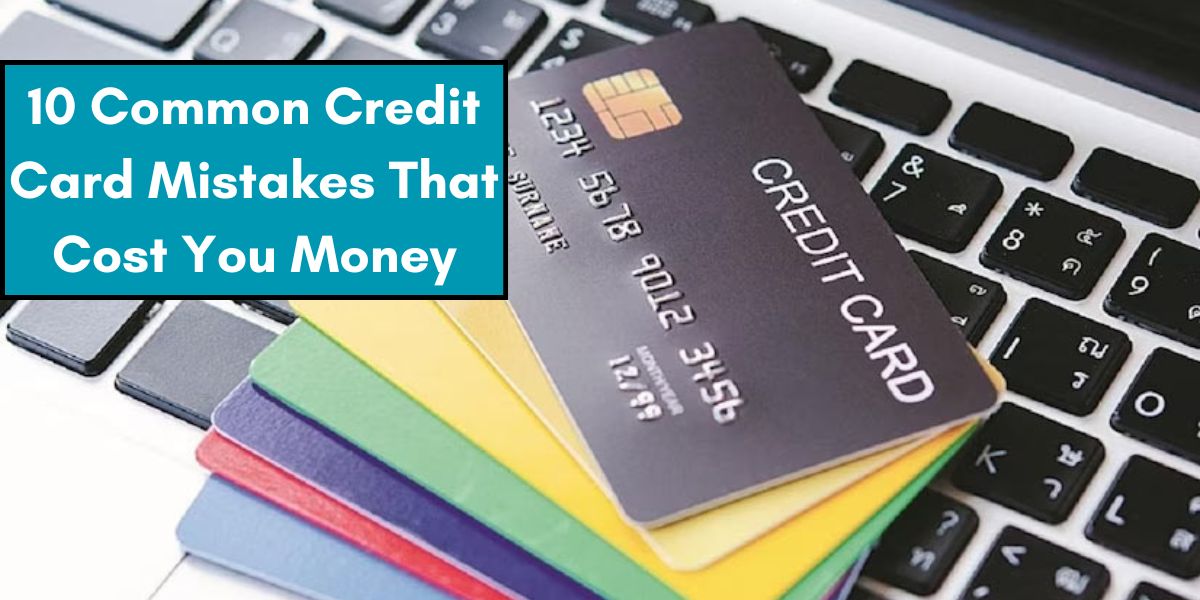Credit cards can be a powerful financial tool—if used wisely. However, many people unknowingly make mistakes that lead to unnecessary fees, high interest charges, and long-term debt. To help you avoid costly errors, here are 10 common credit card mistakes and how to fix them.
1. Making Only the Minimum Payment
Why It’s a Mistake:
Paying only the minimum keeps you in debt longer and results in huge interest charges over time.
How to Fix It:
- Always pay more than the minimum—ideally, pay your full balance each month to avoid interest.
- If you can’t pay in full, try to pay as much as possible to reduce interest costs.
2. Carrying a Balance to “Improve Your Credit Score”
Why It’s a Mistake:
Some believe carrying a balance helps their credit score, but in reality, it only leads to unnecessary interest payments.
How to Fix It:
- Keep your credit utilization below 30% (e.g., if your credit limit is $10,000, keep your balance under $3,000).
- Pay your balance in full each month to avoid paying extra interest.
3. Paying Late or Missing Payments
Why It’s a Mistake:
- Late payments damage your credit score and may lead to late fees or penalty APRs.
- Missing payments for 30+ days can drop your credit score significantly.
How to Fix It:
- Set up automatic payments or reminders to avoid missing due dates.
- If you miss a payment, pay it ASAP to minimize damage.
- Call your issuer and ask for a fee waiver if it was an honest mistake.
4. Ignoring the Interest Rate (APR)
Why It’s a Mistake:
Many people don’t check their credit card’s APR (Annual Percentage Rate) and end up paying high interest rates when carrying a balance.
How to Fix It:
- Always check your card’s APR before using it for big purchases.
- If you have high-interest debt, consider a balance transfer card with a 0% introductory APR.
5. Maxing Out Your Credit Limit
Why It’s a Mistake:
Using too much of your available credit can hurt your credit score and make lenders see you as a risk.
How to Fix It:
- Keep your credit utilization below 30% for a good credit score.
- If you need to make a big purchase, pay it off quickly to reduce utilization.
6. Applying for Too Many Credit Cards at Once
Why It’s a Mistake:
Each new credit application results in a hard inquiry, which can lower your credit score. Multiple applications in a short time make lenders wary of your financial habits.
How to Fix It:
- Only apply for a new credit card when necessary.
- Space out applications by at least six months to prevent too many hard inquiries.
7. Not Using Your Credit Card Rewards
Why It’s a Mistake:
Many people earn rewards but never redeem them, essentially leaving free money on the table. Some rewards even expire if not used in time.
How to Fix It:
- Regularly check your rewards balance and redeem them before they expire.
- Use rewards for cash back, travel, or statement credits to maximize value.
8. Taking Out a Cash Advance
Why It’s a Mistake:
A cash advance (withdrawing cash from your credit card) comes with:
- High fees (often 3%-5% of the amount withdrawn)
- High-interest rates (often 25% or more)
- No grace period, meaning interest starts accruing immediately
How to Fix It:
- Avoid using credit cards for cash advances—use a debit card or emergency savings instead.
- If absolutely necessary, pay it off as soon as possible to minimize interest.
9. Not Reviewing Your Statements
Why It’s a Mistake:
Many people don’t check their credit card statements and miss:
- Unauthorized charges
- Billing errors
- Unwanted subscription fees
How to Fix It:
- Review your statement every month to catch any mistakes or fraudulent activity.
- Report suspicious charges immediately to your credit card issuer.
10. Closing Old Credit Accounts
Why It’s a Mistake:
Closing an old credit card can hurt your credit score because it:
- Reduces your credit history length (a key factor in credit scores).
- Lowers your available credit, increasing your credit utilization ratio.
How to Fix It:
- Keep old credit accounts open, especially if they have no annual fee.
- If you must close an account, pay off balances first and try to close newer accounts instead of older ones.
Avoiding these common credit card mistakes can save you hundreds or even thousands of dollars in interest, fees, and lost rewards. By staying informed and using your credit card responsibly, you can build a strong credit score while taking advantage of perks like cashback, travel rewards, and fraud protection.
FAQs
Should I close a credit card I don’t use?
No, unless it has a high annual fee. Keeping old accounts open helps maintain your credit history and score.
How much of my credit limit should I use?
Stay below 30% utilization for a good credit score. For example, if your limit is $10,000, try to keep your balance under $3,000.
What’s the best way to avoid interest charges?
Pay your full balance every month before the due date.
Is it bad to have multiple credit cards?
Not necessarily! Having multiple cards can increase your available credit (helping your score), but too many applications at once can hurt your score.
How can I check my credit score for free?
You can check your score for free through services like Credit Karma, Experian, or your bank’s credit card app.

